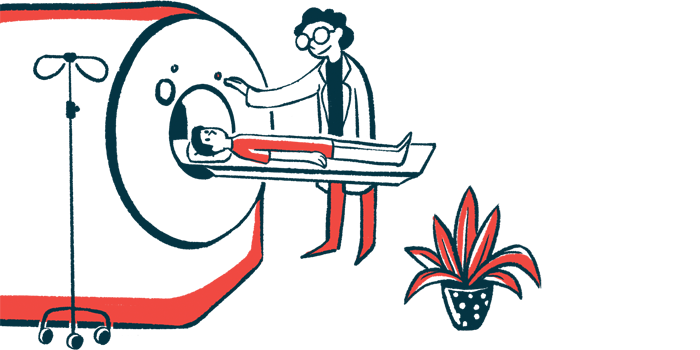Ultrasound tool may help antibody-based treatments reach brain: Study
Focused ultrasound found to temporarily open selective blood-brain barrier

A tool called focused ultrasound, or FUS, may be a safe and promising way to help antibody-based treatments better reach the brain, and clear away toxic amyloid-beta protein clumps (aggregates), in people with Alzheimer’s disease.
The approach involves using targeted sound waves to temporarily open up the selective blood-brain barrier (BBB) that normally prevents large molecules such as antibodies from reaching the brain.
Those are the findings of a proof-of-concept study in which three Alzheimer’s patients received Aduhelm (aducanumab), an approved antibody against amyloid-beta, and FUS directed at brain areas of high toxic aggregate burden.
In all patients, brain areas where focused ultrasound was applied exhibited greater reductions in the amyloid-beta protein relative to brain areas without BBB opening.
“After six months of antibody treatment, we observed an average of 32 percent more reduction in amyloid-beta plaques … in brain areas with blood-brain barrier opening compared to areas with no such opening,” Ali Rezai, MD, the study’s first author and executive chair of the West Virginia University’s Rockefeller Neuroscience Institute (RNI), said in a university press release.
The study, “Ultrasound Blood–Brain Barrier Opening and Aducanumab in Alzheimer’s Disease,” was published in the New England Journal of Medicine.
Focused ultrasound used with Aduhelm in proof-of-concept study
Researchers hailed the findings as a potentially key advancement for treating the progressive neurodegenerative condition.
“We are hopeful that the work we are doing may lead to improvements in outcome for many other patients and their families coping with Alzheimer’s,” said Marc Haut, PhD, the study’s senior author and the director of the memory health clinic at RNI.
“This is an exciting time in the treatment of Alzheimer’s disease,” Haut added.
In the Alzheimer’s brain, a toxic version of amyloid-beta forms clumps, or plaques, that disrupt nerve cell function and drive their death.
Antibodies that target this toxic protein and promote its degradation, including approved therapies Aduhelm and Leqembi (lecanemab), can help ease the burden of these amyloid plaques in the brain and slow disease progression.
However, these treatments — which are infused directly into the bloodstream — are limited in their ability to reach the brain. The BBB, a selective barrier of cells protecting the brain from potentially harmful substances in the bloodstream, also limits the entry of most therapeutic molecules due to their large size.
Higher or more frequent doses are therefore sometimes required for treatments to have their intended therapeutic effects.
“Only 1-2% of drugs can cross the blood-brain barrier, making progress difficult and patient safety challenging,” Maurice R. Ferré, MD, CEO and chairman of Insightec, the company that developed the FUS technology for the study, said in a company press release.
Focused ultrasound can be used to temporarily disrupt particular sections of the BBB. Essentially, the approach involves injecting tiny bubbles into the bloodstream, then applying targeted beams of high-frequency, low-intensity sound waves to specific areas of the brain. The sound waves vibrate the bubbles, opening up gaps in the BBB where medications can travel through.
“The ability to disrupt the blood-brain barrier to effectively deliver treatment demonstrates the power and potential of using focused ultrasound technology when addressing complex neurological conditions,” Ferré said.
First-in-human study tested tool’s use in 3 patients
Preclinical studies have indicated that the use of FUS along with Aduhelm enabled the medication to reach levels in the brain about eight times higher than when focused ultrasound wasn’t used. The combination also was linked to slower cognitive declines and decreased amyloid plaque burden in the brains of mice.
In the first in-human study, two men and one woman with mild Alzheimer’s, ages 59-77, received monthly infusions of Aduhelm for six months. Each was followed by FUS-mediated BBB opening in particular brain areas where amyloid-beta burden was high.
Patients wore a treatment helmet containing more than 1,000 ultrasound probes into an MRI machine, which guided which areas should be targeted. Focused ultrasound was only applied to one side of the brain, with the other serving as non-FUS control regions.
The results showed that reductions in amyloid plaques were numerically greater in brain areas treated with FUS than in areas that hadn’t been treated. Cognitive function remained stable in two patients and worsened in one in the period following the six-month combined treatment.
“Given the small number of participants, it is difficult to determine whether the cognitive changes were related to disease or a procedure,” the researchers wrote.
The approach was found to be generally safe, without any reports of brain swelling or bleeding abnormalities that have been associated with Aduhelm and other anti-amyloid antibody-based treatments.
Focused ultrasound is a non-invasive outpatient procedure for [blood-brain barrier] opening with great promise for improving drug delivery to the brain.
According to Rezai, the clinical trial’s next phase “will begin this year to explore how to further accelerate amyloid-beta removal in a shorter time with focused ultrasound in combination with [Leqembi].”
Future studies still are needed to validate the therapeutic approach in more patients, the researchers noted. Positive results could potentially be helpful for the development of such targeted brain therapy delivery in other neurological conditions.
“Focused ultrasound is a non-invasive outpatient procedure for BBB opening with great promise for improving drug delivery to the brain,” Rezai said.
Neither Insightec nor Biogen (Aduhelm’s manufacturer) sponsored the trial or were involved in study design, data collection or interpretation.








